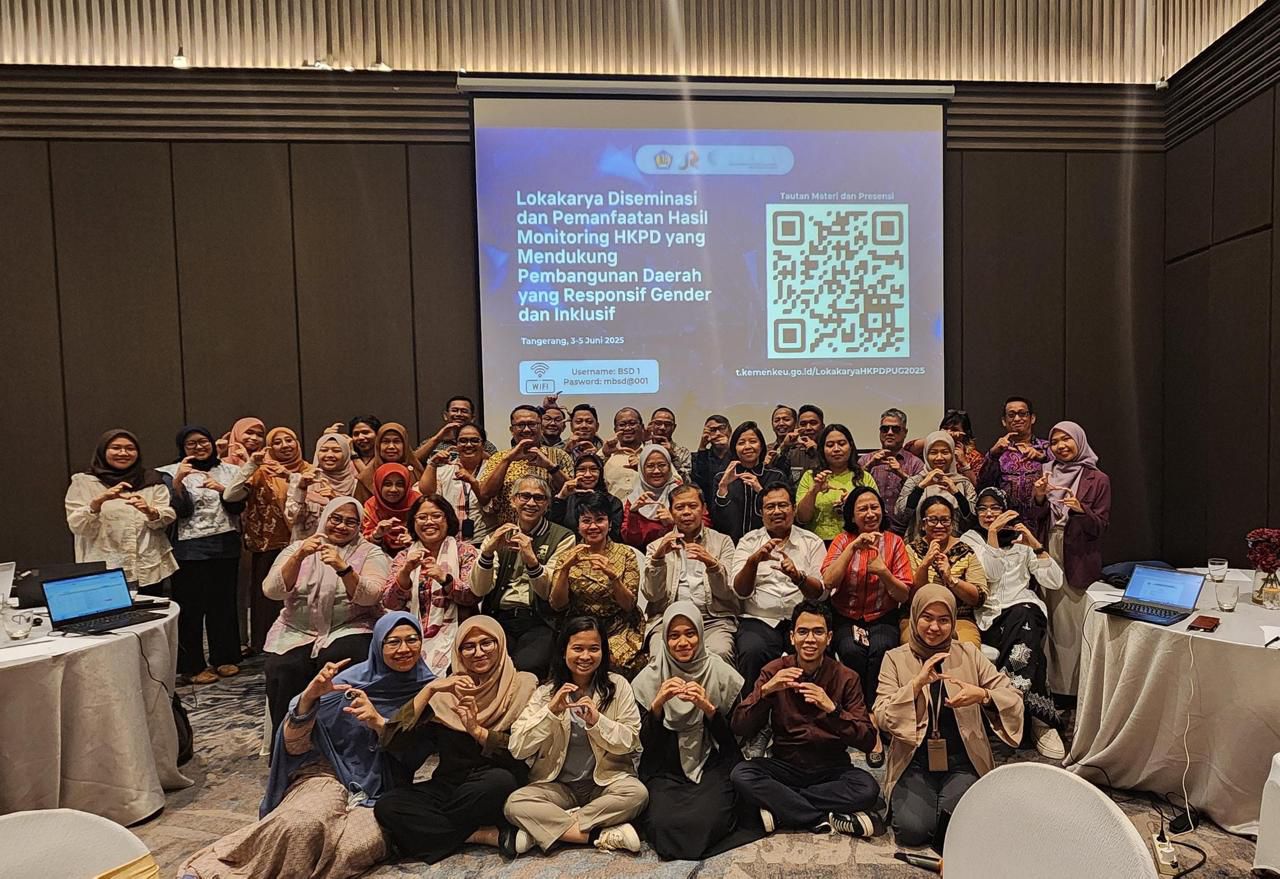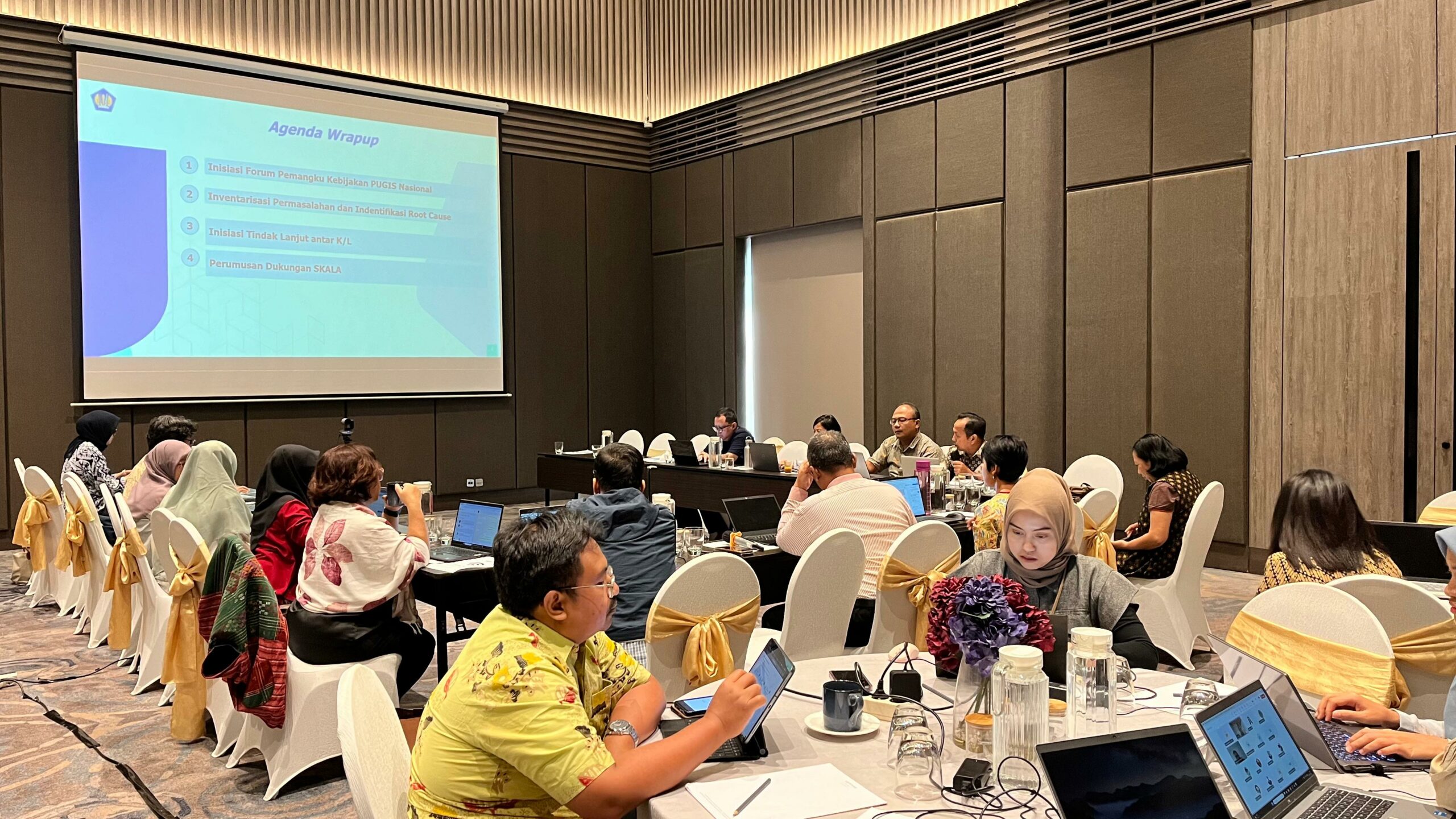Advancing Gender-Responsive Development Through Regional Transfer Funds: Highlights from the Gender-Responsive Intergovernmental Fiscal Relations (HKPD) Workshop

Regional Transfer Funds (Dana Transfer ke Daerah/TKD), including the General Allocation Fund (DAU), Physical and Non-Physical Special Allocation Funds (DAK), and Village Funds, are strategic instruments to promote gender-responsive and inclusive development, particularly targeting vulnerable groups such as women, persons with disabilities, and the elderly.
This issue became the main discussion in the “Workshop on the Dissemination and Utilization of Gender-Responsive Monitoring Results of Central-Regional Fiscal Relations (HKPD)”, held on June 3–5, 2025, at Mercure Bumi Serpong Damai (BSD) Hotel, Tangerang. The event was opened by Ludiro, Secretary of the Directorate General of Fiscal Balance (DJPK) at the Ministry of Finance, and Lisa Noor Humaidah, GEDSI Lead of the SKALA Program.
The workshop brought together representatives from the Ministry of Finance, the Ministry of Home Affairs, the Ministry of National Development Planning (Bappenas), the Ministry of Women’s Empowerment and Child Protection (KPPPA), as well as regional governments from eight SKALA program areas. Discussions focused on monitoring results, lessons learned, and challenges in implementing gender-responsive TKD.
Monitoring across eight provinces in SKALA’s working areas showed that North Kalimantan (Kaltara) and Aceh ranked highest in implementing gender-responsive TKD. North Kalimantan achieved the top score of 4.16, attributed to strong leadership commitment and the active participation of vulnerable groups in development planning.
The monitoring report also identified key challenges, including weak linkages between gender-responsive spending and basic service outcomes, difficulties in conducting gender analysis in various development sectors, and the lack of sex- and disability-disaggregated data in TKD management. In many regions, Gender Mainstreaming (PUG) is still perceived as a mere administrative requirement rather than a substantive policy framework.
Ludiro noted that despite planning and budgeting processes being equipped with tagging mechanisms, field implementation continues to face obstacles. He stressed the importance of regular monitoring to measure outputs, outcomes, and the broader impact of allocated funds.
“We already have monitoring findings. To follow up on the recommendations, there must be collaboration among all stakeholders who play a role in addressing the existing challenges,” Ludiro emphasized.
He urged all parties to maximize their respective roles to enhance support for women, persons with disabilities, and other vulnerable groups.
“These monitoring findings serve as a reference to the current conditions, which are still far from ideal. Therefore, we need an action plan to close the gap between the current situation and the ideal state we aspire to achieve,” he added.
Meanwhile, Tirta Sutedjo, Director of Poverty Reduction and Social Welfare (PKKS) at Bappenas, presented on “Social Inclusion Development Policies at the National and Regional Levels.” She reminded participants of the nation’s long-term vision of Indonesia Emas 2045, guided by the principle “No one left behind.”
“That is why inclusive development must be a shared focus across institutions, budgeting frameworks, and the engagement of vulnerable and marginalized groups,” Tirta stressed.
Another speaker, Harry Irawan from the Directorate General of Regional Development (Bangda) at the Ministry of Home Affairs, discussed “Integration of Gender and Social Inclusion Policies into the 2025–2029 Regional Medium-Term Development Plans (RPJMD) Based on the Regional Development Information System (SIPD).” He highlighted the need for gender tagging in SIPD to be directly linked to development outcomes. Therefore, gender mainstreaming must go beyond mere labeling. It must generate tangible impacts that lead to real change.
Similarly, Muhammad Zul Fauzi Sinapoy from Bappenas’ Directorate of Family, Caregiving, Women and Children welcomed the monitoring findings and suggested that the results be used to clarify the relationship between TKD spending, improvements in the Gender Development Index (GDI), and reductions in the Gender Inequality Index (GII).
With strong collaboration between central and regional governments, coupled with robust data support, it is expected that state budget management will genuinely reflect a commitment to all citizens, including the most vulnerable groups.
The workshop concluded with several key recommendations, including enhancing monitoring instruments based on the Gender and Social Inclusion Mainstreaming (PUGIS) approach, integrating monitoring results into the RPJMD and regional planning systems, and fostering cross-ministerial collaboration to strengthen data interoperability.
As a development partner, the SKALA Program continues to provide technical support and facilitate dialogue among stakeholders. This support is expected to accelerate the establishment of fiscally responsive and inclusive governance that addresses the diverse needs of society.
Click the Knowledge Brief “Towards Gender-Responsive Fiscal Capacity. Lessons from the Implementation of Intergovernmental Transfers in Eight SKALA-Partner Provinces” to read a summary of findings, lessons learned, and recommendations from the monitoring results.







